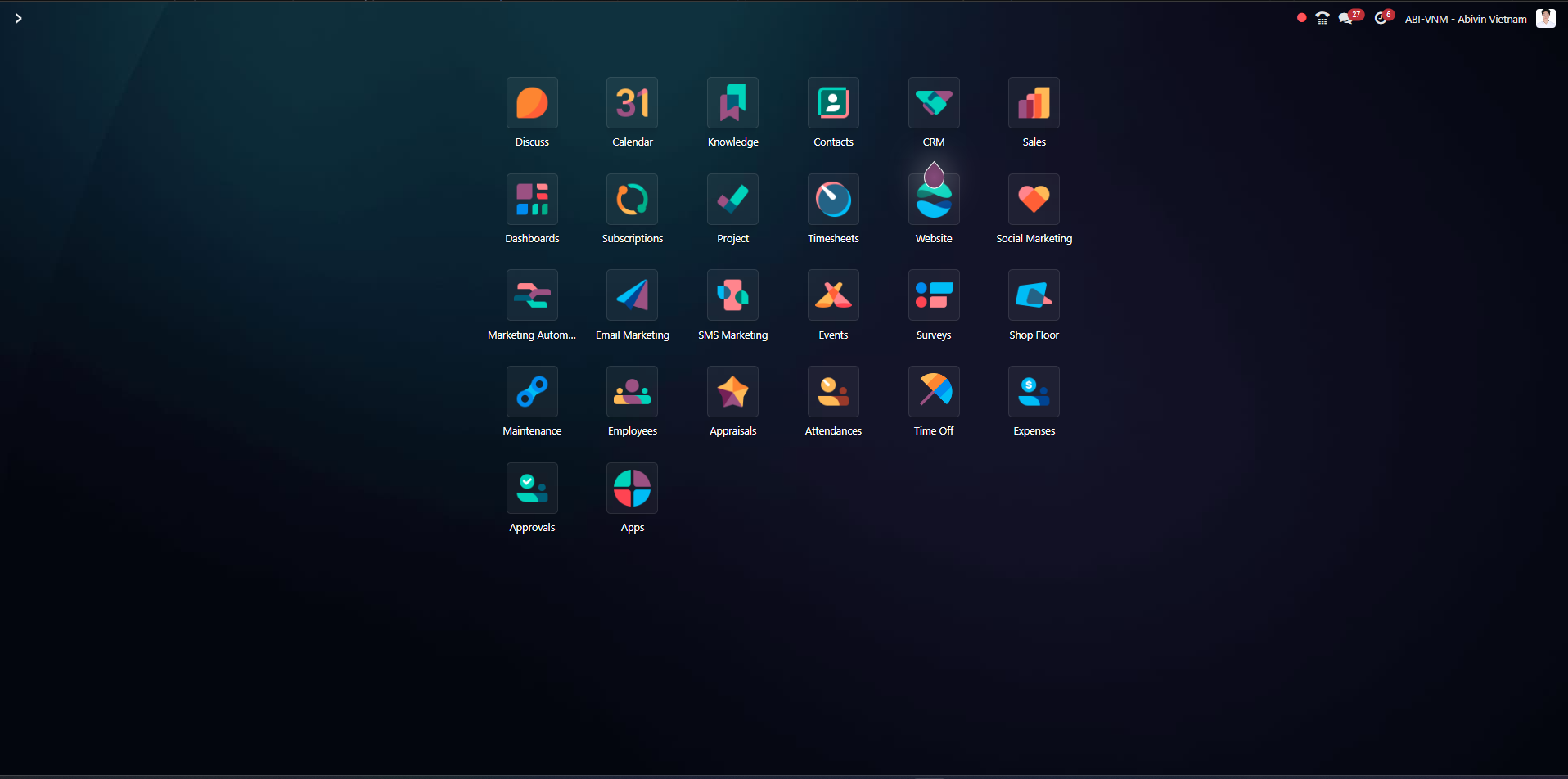In the current digital landscape, businesses are continuously searching for solutions to optimize their operations and boost productivity. Odoo Open ERP stands out as a powerful tool that meets these demands through its extensive features, advantages, and adaptable implementation options. Let’s explore how Odoo can facilitate your business growth.
I. Overview of Odoo Open ERP
What is Odoo Open ERP?
Odoo Open ERP (Enterprise Resource Planning) is an open-source software platform established in 2005 by Fabien Pinckaers, crafted to enhance operational efficiency for businesses. It consolidates various functions such as sales, human resources, inventory, and accounting into a unified system. With its modular design and comprehensive application suite, Odoo is a flexible option suitable for businesses of all sizes.

Importance of ERP Systems for Modern Businesses
ERP systems are vital for contemporary enterprises as they centralize data management, automate workflows, and improve decision-making processes. These systems enable organizations to streamline operations, minimize manual tasks, and enhance overall efficiency—offering significant advantages for companies aiming to scale.
Evolution and Market Presence of Odoo
Launched in 2005 as "TinyERP," Odoo quickly transformed, rebranding to OpenERP in 2010 and finally to Odoo in 2014. Today, it ranks among the fastest-growing ERP solutions worldwide, boasting over 7 million users across diverse industries. The platform features more than 30 core applications along with thousands of third-party apps, solidifying its position as a leader in ERP innovation.
II. Key Features of Odoo Open ERP

Modular Architecture and Customization
Odoo's modular framework allows businesses to select and customize only the necessary modules—such as CRM, Sales, HR, Accounting, and Inventory—tailoring the system to their specific needs. This adaptability ensures that companies only invest in what they require and can scale the system alongside their growth.
Comprehensive Application Suite
Odoo offers an extensive array of applications that address every facet of business management, including CRM, accounting, inventory control, project management, HR, and e-commerce. Each application integrates seamlessly within the platform, providing a holistic view of the organization and facilitating improved coordination and data sharing. This all-in-one solution reduces reliance on multiple software systems.
User-Friendly Interface and Accessibility
The intuitive interface of Odoo enhances user experience by simplifying navigation and making it easy for employees to adapt to the platform. Accessible on various devices—including desktops, tablets, and smartphones—Odoo enables staff to access information and perform tasks from anywhere at any time. This capability is essential for businesses with remote or mobile workforces, ensuring uninterrupted operations regardless of location.
By leveraging Odoo Open ERP's capabilities, businesses can significantly enhance their operational efficiency and drive growth in today's competitive market.
III. Benefits of Using Odoo Open ERP
Cost-Effectiveness and Scalability
Odoo stands out as a cost-effective alternative to many proprietary ERP solutions due to its open-source nature. Its flexible pricing model accommodates businesses of all sizes, from startups to large corporations. Odoo's scalability allows organizations to add new modules and users as needed without incurring substantial upfront costs, ensuring that companies only pay for what they utilize. This affordability makes Odoo an attractive option for businesses aiming for growth.
Integration Capabilities with Other Software and Tools
One of Odoo's most notable features is its robust integration capabilities. It easily connects with a variety of third-party software and tools, including payment gateways, e-commerce platforms, and shipping services. This functionality enables businesses to continue using their existing systems while benefiting from Odoo’s powerful ERP features. The seamless integration helps eliminate data silos, ensuring that all information is centralized and accessible within a single platform.
Enhanced Collaboration and Productivity Among Teams
By consolidating all business functions into one system, Odoo promotes improved collaboration and communication among teams. Employees can access real-time data, share information, and make informed decisions swiftly. This streamlined workflow enhances productivity, reduces response times, and fosters more efficient business operations. The collaborative environment created by Odoo contributes to a more connected workforce, ultimately boosting job satisfaction.
Customization and Flexibility
Odoo offers high levels of customization, enabling businesses to tailor the platform to their specific needs. Whether adjusting existing modules or creating new ones, Odoo provides the flexibility necessary to adapt to evolving business requirements. This customization ensures that the ERP system aligns perfectly with organizational goals and processes, delivering a more personalized experience.
Strong Community and Vendor Support
Odoo benefits from a large and active community of developers, partners, and users who contribute to its ongoing development and improvement. This community-driven approach guarantees continuous updates, new features, and bug fixes. Additionally, businesses can access various professional support options through Odoo's certified partners or directly from Odoo itself, ensuring they receive the assistance they need.
IV. Implementation and Support
Steps for Implementing Odoo Open ERP in an Organization
Implementing Odoo in an organization involves several key steps:
- Assessment and Planning: Identify your organization's specific needs and select the necessary modules. Conduct a thorough analysis to pinpoint core functions that the ERP system will manage.
- Configuration and Customization: Tailor the selected modules to align with your business processes by setting up workflows, user roles, and permissions.
- Data Migration: Transfer existing data from legacy systems to Odoo while ensuring data integrity and accuracy through cleansing and standardization.
- User Training: Provide comprehensive training for employees on how to effectively use the new system, ensuring familiarity with its functionalities.
- Testing and Go-Live: Conduct thorough testing of the system before going live to identify potential issues or areas for improvement through user acceptance testing (UAT).
- Post-Implementation Review: Continuously monitor system performance and gather user feedback to identify areas for enhancement.
Available Resources for Training and Support
Odoo provides a wealth of resources for businesses getting started, including official documentation, tutorials, webinars, and forums that offer insights into effective platform use and troubleshooting common issues. For more personalized support, numerous third-party vendors offer professional training and implementation services.
Community and Professional Support Options
The strong community surrounding Odoo is one of its key advantages. This community includes developers, users, and partners who share knowledge in forums and contribute new modules. Businesses can also opt for professional support from certified partners or directly from Odoo based on their needs and budget. Professional support may include dedicated assistance, custom development, and priority service options.
V. Conclusion
Odoo Open ERP offers a versatile solution for businesses seeking efficient management and growth opportunities. Its modular structure, integration capabilities, and robust community support make it an ideal choice for organizations looking to streamline operations and enhance productivity. Whether you are a small startup or a large enterprise, Odoo provides the flexibility and functionality necessary to meet your unique business requirements.
Unlocking the Potential of Odoo Open ERP for Modern Businesses